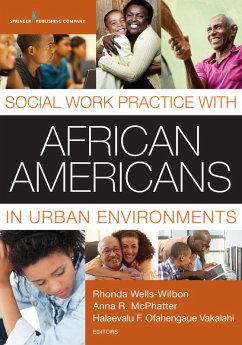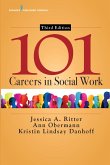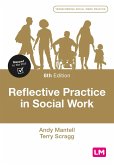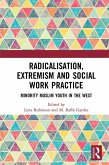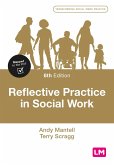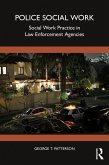Social Work Practice with African Americans in Urban Environments (eBook, ePUB)
Redaktion: Vakalahi, Halaevalu F. O.; McPhatter, Anna R.; Wells-Wilbon, Rhonda


Alle Infos zum eBook verschenken

Social Work Practice with African Americans in Urban Environments (eBook, ePUB)
Redaktion: Vakalahi, Halaevalu F. O.; McPhatter, Anna R.; Wells-Wilbon, Rhonda
- Format: ePub
- Merkliste
- Auf die Merkliste
- Bewerten Bewerten
- Teilen
- Produkt teilen
- Produkterinnerung
- Produkterinnerung

Hier können Sie sich einloggen

Bitte loggen Sie sich zunächst in Ihr Kundenkonto ein oder registrieren Sie sich bei bücher.de, um das eBook-Abo tolino select nutzen zu können.
The experiences of African Americans in urban communities are distinct from those of other ethnic groups, and to be truly understood require an in-depth appreciation of the interface between micro- and macro-level factors. This sweeping text, an outgrowth of a groundbreaking urban social work curriculum, focuses exclusively on the African-American experience through field education, community engagement, and practice. It presents a framework for urban social work practice that encompasses a deep understanding of the challenges faced by this community. From a perspective based on empowerment,…mehr
- Geräte: eReader
- mit Kopierschutz
- eBook Hilfe
- Größe: 1.59MB
![101 Careers in Social Work (eBook, ePUB) 101 Careers in Social Work (eBook, ePUB)]() Jessica A. Ritter101 Careers in Social Work (eBook, ePUB)32,95 €
Jessica A. Ritter101 Careers in Social Work (eBook, ePUB)32,95 €![Reflective Practice in Social Work (eBook, ePUB) Reflective Practice in Social Work (eBook, ePUB)]() Reflective Practice in Social Work (eBook, ePUB)28,95 €
Reflective Practice in Social Work (eBook, ePUB)28,95 €![Radicalisation, Extremism and Social Work Practice (eBook, ePUB) Radicalisation, Extremism and Social Work Practice (eBook, ePUB)]() Radicalisation, Extremism and Social Work Practice (eBook, ePUB)40,95 €
Radicalisation, Extremism and Social Work Practice (eBook, ePUB)40,95 €![Reflective Practice in Social Work (eBook, ePUB) Reflective Practice in Social Work (eBook, ePUB)]() Reflective Practice in Social Work (eBook, ePUB)28,95 €
Reflective Practice in Social Work (eBook, ePUB)28,95 €![An Introduction to Social Work Theory (eBook, ePUB) An Introduction to Social Work Theory (eBook, ePUB)]() David HoweAn Introduction to Social Work Theory (eBook, ePUB)33,95 €
David HoweAn Introduction to Social Work Theory (eBook, ePUB)33,95 €![Police Social Work (eBook, ePUB) Police Social Work (eBook, ePUB)]() George T. PattersonPolice Social Work (eBook, ePUB)37,95 €
George T. PattersonPolice Social Work (eBook, ePUB)37,95 €![Social Work Practice in the Criminal Justice System (eBook, ePUB) Social Work Practice in the Criminal Justice System (eBook, ePUB)]() George PattersonSocial Work Practice in the Criminal Justice System (eBook, ePUB)36,95 €
George PattersonSocial Work Practice in the Criminal Justice System (eBook, ePUB)36,95 €-
-
-
The book describes an overarching framework for understanding and practicing urban social work, including definitions and theories that have critical implications for working with people in such communities. It encompasses the contributions of African American pioneers regarding a response to such challenges as poverty, oppression, and racism. Focusing on the theory, practice, and policy aspects of urban social work, the book examines specific subsets of the urban African-American population including children, adults, families and older adults. It addresses the challenges of urban social work in relation to public health, health, and mental health; substance abuse; criminal justice; and violence prevention. Additionally, the book discusses how to navigate the urban built environment and the intersection between African Americans and other diverse groups. Chapters include outcome measures of effectiveness, case studies, review questions, suggested activities, and supplemental readings.
Key Features:
- Fills a void in the literature on urban social work practice with African Americans
- Presents the outgrowth of a renowned urban curriculum, field education, research, community engagement, and practice
- Fulfills the requirements of the CSWE in the Educational Policy and Accreditation Standards regarding diversity
- Synthesizes micro, mezzo, and macro content in each chapter
- Provides contributions from African-American pioneers in urban social work practice
Dieser Download kann aus rechtlichen Gründen nur mit Rechnungsadresse in A, D ausgeliefert werden.
- Produktdetails
- Verlag: Springer Publishing Company
- Seitenzahl: 352
- Erscheinungstermin: 8. September 2015
- Englisch
- ISBN-13: 9780826130754
- Artikelnr.: 54119065
- Verlag: Springer Publishing Company
- Seitenzahl: 352
- Erscheinungstermin: 8. September 2015
- Englisch
- ISBN-13: 9780826130754
- Artikelnr.: 54119065
- Herstellerkennzeichnung Die Herstellerinformationen sind derzeit nicht verfügbar.
Foreword by Sandra Edmonds Crewe, PhD, MSW, ACSW
Preface
Acknowledgment
Share Social Work Practice With African Americans in Urban Environments
SECTION I: CONCEPTUALIZING URBAN SOCIAL WORK
1. Urban Social Work With African Americans: Critical Perspectives,
Concepts, and Theories
Anna R. McPhatter
Underlying Assumptions, Beliefs, and Principles
Critical Concepts, Perspectives, and Theories
Conceptualizing a Social Work Curriculum: Case Study
School of Social Work Goals
Implications
For Further Study
References
2. African American Pioneers of Urban Social Work
Iris Carlton-LaNey
Women’s Club
The Politics of Reform
Settlement Houses
The National Urban League
Housing in the Cities
Taking Care of Children and Youth
Discussion
Implications
For Further Study
Notes
References
SECTION II: CHILDREN, YOUTH, AND FAMILIES
3. Child Welfare in Urban Environments
Kimberly Y. Johnson and Sandra S. Chipungu
Recent Trends in Foster Care
Demographic Trends in Foster Care
Demographic Trends in Maryland
Disproportionality: Child Welfare
Financing Child Welfare: Penetration Rates
Trauma: Child Welfare
Workforce Issues
Trauma Typologies
Trauma and Attachment Issues for Children
Trauma and Mental Health
Trauma and Well-Being
Trauma: Helping the Child Welfare Professional
Trauma-Informed Practice and Interventions
Implications for Policy
Implications for Social Work Education
Implications for Practice
For Further Study
References
4. Engaging Urban African American Adolescents in Treatment
Michael M. Sinclair and Belinda Davis Smith
Culturally Competent Practice With Urban Adolescents
The Urban Adolescent
Poverty
Family Structure
Community Violence
Substance Abuse
Engaging the African American Adolescent
Rap Therapy
Implications
For Further Study
References
5. Coming to America: Black Immigrants in Urban Communities
Belinda Davis Smith, Isiah Marshall Jr., Dana Burdnell Wilson, and Errol S.
Bolden
Black Immigrants Defined
Black Caribbean Immigrants
African Immigrants
Urban Black Immigrants: Immigration and Social Policy
Historical Analysis
Contemporary Policies
Ecological Framework in Understanding Black Immigrant Families
Black Immigrant Family Systems and Child Rearing
Crime and Police Interaction
Education
Mezzo- and Macro-Level Environments
Help-Seeking Behaviors
Formal and Informal Support Systems
Implications
Cultural Competence
Advocacy
For Further Study
References
6. That Is So Queer: Building a Foundation for Working With African
American Lesbian, Gay, and Transgender Individuals in the Community
Laurens G. Van Sluytman, Denise Torres, and Saanjh Aakash Kishore
Relevant Core Competencies (Educational Policy and Accreditation Standards)
In the Life: Black Gay and Lesbian Lives
Black Gay Male Case Study—Evaluation Research
Youth and Older GLT Lives
GLT Youth Case Study—Advocacy and Policy
BGLT Older Lives
GLT Elder Case Study—Program Development
Transgender Lives
Transgender Population Case Study—Individual Practice
Implications
For Further Study
Notes
References
SECTION III: PUBLIC HEALTH, HEALTH, AND MENTAL HEALTH
7. Social Work and Health—Understanding the Contexts for Social Work and
Public Health
Paul Archibald and Kim Dobson-Sydnor
The Social Work Public Health Framework
Healthy People 2020
The ACA
The Social Determinants of Health and Health Disparities
A Plan for Action
Social Work Public Health Analysis: African American Mental Health Status
Implications
For Further Study
References
8. Exploring Urban Faith-Based–Social Work Community Collaboration for
Mental Health Promotion in Urban African American Communities
Paul Archibald, Kevin Daniels, and Sandra Austin
UAA Spirituality
Urban Faith-Based Organizations’ and Urban Social Work Practitioners’
Health Promotion
Implications for Social Work Practice in Urban Environments
Case Study
For Further Study
References
9. Urban Health: Four Issues of Concerns
Linda Darrell and LaPricia Lewis Boyer
Sickle Cell Anemia
Diabetes
Coronary Heart Disease
Hypertension
Implications for the Future
For Further Study
References
10. Inner City Blues: Social Work Practice With Urban Communities Impacted
by HIV/AIDS
Denise McLane-Davison and Warren W. Hewitt
AIDS: The Great Maafa
Reframing an Old Problem: Seminole Frameworks
Community and Government Responses
Social Work Front and Center
Implications for the Future
For Further Study
References
11. Mental and Emotional Wellness Among African Americans in Urban
Environments: What Do We Know? How Can We Improve Outcomes?
Rhonda Wells-Wilbon, Kenya Jones, and Thelma Rich
Defining Mental and Emotional Health and Well-Being
A Cultural Lens
A Historical Perspective
The Urban Environment
Implications
For Further Study
Notes
References
SECTION IV: GERONTOLOGY AND AGING ADULTS
12. The Magic of Aging in the Urban Environment
Margaret E. Pittman, Leeza M. Scheidt, Merissa R. Munford, and Halaevalu F.
Ofahengaue Vakalahi
Our Responsibility
The Urban Context and Major Aging Issues
Supports and Resources in the Urban Environment
Working With the Aging Population
Making a Difference
Meeting Urban Needs
Implications for the Future
For Further Study
References
13. On Urban Ground: An Integrated Framework for Working With African
American Grandparent Caregivers
Gaynell M. Simpson, Belinda Davis Smith, and Dana Burdell Wilson
Multigenerational and Skipped-Generation Households
Grandfather Caregivers
Historical Traditions of African American Caregiving
An Integrated Framework: Ecological Perspective, Strengths Perspective, and
Empowerment Theory
A Collective Response to Urban Grandparent Caregiving
The Faith Community
Family Ties Project
Implications for the Future
For Further Study
References
14. Coping With Loss and Grief in Urban Communities
Tanya L. Sharpe and Margaret E. Pittman
Loss
Grief
Coping With Urban Traumatic Loss and Grief
Implications for the Future
For Further Study
References
SECTION V: SUBSTANCE ABUSE, CRIMINAL JUSTICE, AND VIOLENCE PREVENTION
15. Youth Violence—An Overview: Prevalence and Intervention Strategies to
Address Violence Among Urban African American Youth
Rhonda Wells-Wilbon, Von E. Nebbitt, and Margaret Lombe
Conceptualizing Youth Violence
Prevalence of Exposure to Youth Violence
Youth Violence Across Domains
Preventive Interventions
Implications
For Further Study
References
16. Providing Culturally Sensitive Intervention With Urban African American
Victims of Intimate Partner Violence
Yvonne V. Greene and Marni N. Seyyid
Overview of Intimate Partner Violence
Culturally Competent Practice
Societal Perceptions of African American Women and Men
Unique Cultural Challenges Faced by African American Women in Violent
Intimate Relationships and Barriers to Reporting
Implications for Social Work Practice
Case Study
For Further Study
References
17. Substance Use Prevention in the Urban Environment
Anthony Estreet
Substance Use Prevention
Models of Substance Use Prevention
Substance Abuse Prevention Frameworks
Promising Culturally Specific Prevention Framework: Afrocentric Theory
Substance Use Prevention Moves Toward Evidence-Based Practices
Prevention Programs That Work
Prevention Program Highlight
Implications for Social Work
For Further Study
References
18. Substance Use Treatment Approaches in the Urban Environment
Anthony Estreet
Treatment for Substance Use Disorders
Levels of Substance Use Disorder Treatment
Detoxification Programs
Inpatient Treatment
Residential Treatment
Partial Hospitalization Treatment
Intensive Outpatient Treatment
Traditional Outpatient Treatment
Evidence-Based Treatment Approaches
Motivational Enhancement Therapy
Cognitive Behavioral Therapy
Afrocentric Paradigm as an Emerging Treatment Approach for African
Americans
Implications for Social Work Practice
For Further Study
References
19. Educating Social Workers in a Client-Centered Defense Practice
Lori James-Townes and Marquis Chandler
Two Professions: Serving Those Disproportionately Impacted by
Over-Incarceration
The Maryland Office of Public Defender: Serving the Urban Community
MOPD: A National Model
Training the Defense-Based Social Worker
Implications for the Future
For Further Study
Notes
References
20. Urban Gangs: Epidemiological Criminology as a Theoretical Framework for
Social Work Practice
Kevin Daniels, Stacy A. Smith, Paul Archibald, and Timothy Akers
African American Urban Settings and Criminal Behavior
The Geospatial and Global Origins of Gang Activity
Contextualizing the Dynamics and Complexities of Urban Gangs
Evolution of the Hybrid Gang Family
Epidemiological Criminology as a Theoretical Framework in Social Work
Practice
Evidence-Based Practice Within Urban Settings
Case Study: C-Gangs
Implications for Social Work
For Further Study
References
SECTION VI: NAVIGATING THE URBAN BUILT ENVIRONMENT
21. Research With Urban African American Adolescents and Emerging Adults:
Implications for Quasi-Community-Based Participatory Research and Community
Action Research
M. Taqi Tirmazi, Von E. Nebbitt, Kim Dobson Sydnor, and Dawn Thurman
Context for Conducting Research Among African American Urban Youth
Socioecocultural and Acculturation Theory
Community-Based Participatory Research and Participatory Action Research
Implications
For Further Study
Note
References
22. Leadership and Administration of Systems in Urban Settings
Colette Walker Thomas and Jarrell J. McRae
Definitions
Macro Practice as an Urban Social Work Leader
Guiding Organizational Change
Working Within Systems: Quality Service Delivery Versus Organizational
Expectations
Urban Leaders Leading With Grace
Organizational Culture and Leadership
Navigating Resources in an Urban Community
Implications for the Future
For Further Study
References
23. Urgency and Advocacy for Organizational Change in Urban Public School
Settings: A Social Work Perspective on Meeting the Needs of African
American Children
Claudia Lawrence-Webb
Structure of Public U.S. Education System
Historical Evolvement of Education in the United States
Urban Populations and Educational Policies
Perception of Teachers in Urban Environments
Building Educational Capacity
Implications for the Future
For Further Study
References
24. Policies That Impact Urban Communities
Tricia Bent-Goodley
Policies That Impact Urban Communities
Framework
Education, Violence, and Families: Intersections and Resistance
Building on Strengths, Resiliency, and African American Cultural Values
Implications
For Further Study
References
Index
Foreword by Sandra Edmonds Crewe, PhD, MSW, ACSW
Preface
Acknowledgment
Share Social Work Practice With African Americans in Urban Environments
SECTION I: CONCEPTUALIZING URBAN SOCIAL WORK
1. Urban Social Work With African Americans: Critical Perspectives,
Concepts, and Theories
Anna R. McPhatter
Underlying Assumptions, Beliefs, and Principles
Critical Concepts, Perspectives, and Theories
Conceptualizing a Social Work Curriculum: Case Study
School of Social Work Goals
Implications
For Further Study
References
2. African American Pioneers of Urban Social Work
Iris Carlton-LaNey
Women’s Club
The Politics of Reform
Settlement Houses
The National Urban League
Housing in the Cities
Taking Care of Children and Youth
Discussion
Implications
For Further Study
Notes
References
SECTION II: CHILDREN, YOUTH, AND FAMILIES
3. Child Welfare in Urban Environments
Kimberly Y. Johnson and Sandra S. Chipungu
Recent Trends in Foster Care
Demographic Trends in Foster Care
Demographic Trends in Maryland
Disproportionality: Child Welfare
Financing Child Welfare: Penetration Rates
Trauma: Child Welfare
Workforce Issues
Trauma Typologies
Trauma and Attachment Issues for Children
Trauma and Mental Health
Trauma and Well-Being
Trauma: Helping the Child Welfare Professional
Trauma-Informed Practice and Interventions
Implications for Policy
Implications for Social Work Education
Implications for Practice
For Further Study
References
4. Engaging Urban African American Adolescents in Treatment
Michael M. Sinclair and Belinda Davis Smith
Culturally Competent Practice With Urban Adolescents
The Urban Adolescent
Poverty
Family Structure
Community Violence
Substance Abuse
Engaging the African American Adolescent
Rap Therapy
Implications
For Further Study
References
5. Coming to America: Black Immigrants in Urban Communities
Belinda Davis Smith, Isiah Marshall Jr., Dana Burdnell Wilson, and Errol S.
Bolden
Black Immigrants Defined
Black Caribbean Immigrants
African Immigrants
Urban Black Immigrants: Immigration and Social Policy
Historical Analysis
Contemporary Policies
Ecological Framework in Understanding Black Immigrant Families
Black Immigrant Family Systems and Child Rearing
Crime and Police Interaction
Education
Mezzo- and Macro-Level Environments
Help-Seeking Behaviors
Formal and Informal Support Systems
Implications
Cultural Competence
Advocacy
For Further Study
References
6. That Is So Queer: Building a Foundation for Working With African
American Lesbian, Gay, and Transgender Individuals in the Community
Laurens G. Van Sluytman, Denise Torres, and Saanjh Aakash Kishore
Relevant Core Competencies (Educational Policy and Accreditation Standards)
In the Life: Black Gay and Lesbian Lives
Black Gay Male Case Study—Evaluation Research
Youth and Older GLT Lives
GLT Youth Case Study—Advocacy and Policy
BGLT Older Lives
GLT Elder Case Study—Program Development
Transgender Lives
Transgender Population Case Study—Individual Practice
Implications
For Further Study
Notes
References
SECTION III: PUBLIC HEALTH, HEALTH, AND MENTAL HEALTH
7. Social Work and Health—Understanding the Contexts for Social Work and
Public Health
Paul Archibald and Kim Dobson-Sydnor
The Social Work Public Health Framework
Healthy People 2020
The ACA
The Social Determinants of Health and Health Disparities
A Plan for Action
Social Work Public Health Analysis: African American Mental Health Status
Implications
For Further Study
References
8. Exploring Urban Faith-Based–Social Work Community Collaboration for
Mental Health Promotion in Urban African American Communities
Paul Archibald, Kevin Daniels, and Sandra Austin
UAA Spirituality
Urban Faith-Based Organizations’ and Urban Social Work Practitioners’
Health Promotion
Implications for Social Work Practice in Urban Environments
Case Study
For Further Study
References
9. Urban Health: Four Issues of Concerns
Linda Darrell and LaPricia Lewis Boyer
Sickle Cell Anemia
Diabetes
Coronary Heart Disease
Hypertension
Implications for the Future
For Further Study
References
10. Inner City Blues: Social Work Practice With Urban Communities Impacted
by HIV/AIDS
Denise McLane-Davison and Warren W. Hewitt
AIDS: The Great Maafa
Reframing an Old Problem: Seminole Frameworks
Community and Government Responses
Social Work Front and Center
Implications for the Future
For Further Study
References
11. Mental and Emotional Wellness Among African Americans in Urban
Environments: What Do We Know? How Can We Improve Outcomes?
Rhonda Wells-Wilbon, Kenya Jones, and Thelma Rich
Defining Mental and Emotional Health and Well-Being
A Cultural Lens
A Historical Perspective
The Urban Environment
Implications
For Further Study
Notes
References
SECTION IV: GERONTOLOGY AND AGING ADULTS
12. The Magic of Aging in the Urban Environment
Margaret E. Pittman, Leeza M. Scheidt, Merissa R. Munford, and Halaevalu F.
Ofahengaue Vakalahi
Our Responsibility
The Urban Context and Major Aging Issues
Supports and Resources in the Urban Environment
Working With the Aging Population
Making a Difference
Meeting Urban Needs
Implications for the Future
For Further Study
References
13. On Urban Ground: An Integrated Framework for Working With African
American Grandparent Caregivers
Gaynell M. Simpson, Belinda Davis Smith, and Dana Burdell Wilson
Multigenerational and Skipped-Generation Households
Grandfather Caregivers
Historical Traditions of African American Caregiving
An Integrated Framework: Ecological Perspective, Strengths Perspective, and
Empowerment Theory
A Collective Response to Urban Grandparent Caregiving
The Faith Community
Family Ties Project
Implications for the Future
For Further Study
References
14. Coping With Loss and Grief in Urban Communities
Tanya L. Sharpe and Margaret E. Pittman
Loss
Grief
Coping With Urban Traumatic Loss and Grief
Implications for the Future
For Further Study
References
SECTION V: SUBSTANCE ABUSE, CRIMINAL JUSTICE, AND VIOLENCE PREVENTION
15. Youth Violence—An Overview: Prevalence and Intervention Strategies to
Address Violence Among Urban African American Youth
Rhonda Wells-Wilbon, Von E. Nebbitt, and Margaret Lombe
Conceptualizing Youth Violence
Prevalence of Exposure to Youth Violence
Youth Violence Across Domains
Preventive Interventions
Implications
For Further Study
References
16. Providing Culturally Sensitive Intervention With Urban African American
Victims of Intimate Partner Violence
Yvonne V. Greene and Marni N. Seyyid
Overview of Intimate Partner Violence
Culturally Competent Practice
Societal Perceptions of African American Women and Men
Unique Cultural Challenges Faced by African American Women in Violent
Intimate Relationships and Barriers to Reporting
Implications for Social Work Practice
Case Study
For Further Study
References
17. Substance Use Prevention in the Urban Environment
Anthony Estreet
Substance Use Prevention
Models of Substance Use Prevention
Substance Abuse Prevention Frameworks
Promising Culturally Specific Prevention Framework: Afrocentric Theory
Substance Use Prevention Moves Toward Evidence-Based Practices
Prevention Programs That Work
Prevention Program Highlight
Implications for Social Work
For Further Study
References
18. Substance Use Treatment Approaches in the Urban Environment
Anthony Estreet
Treatment for Substance Use Disorders
Levels of Substance Use Disorder Treatment
Detoxification Programs
Inpatient Treatment
Residential Treatment
Partial Hospitalization Treatment
Intensive Outpatient Treatment
Traditional Outpatient Treatment
Evidence-Based Treatment Approaches
Motivational Enhancement Therapy
Cognitive Behavioral Therapy
Afrocentric Paradigm as an Emerging Treatment Approach for African
Americans
Implications for Social Work Practice
For Further Study
References
19. Educating Social Workers in a Client-Centered Defense Practice
Lori James-Townes and Marquis Chandler
Two Professions: Serving Those Disproportionately Impacted by
Over-Incarceration
The Maryland Office of Public Defender: Serving the Urban Community
MOPD: A National Model
Training the Defense-Based Social Worker
Implications for the Future
For Further Study
Notes
References
20. Urban Gangs: Epidemiological Criminology as a Theoretical Framework for
Social Work Practice
Kevin Daniels, Stacy A. Smith, Paul Archibald, and Timothy Akers
African American Urban Settings and Criminal Behavior
The Geospatial and Global Origins of Gang Activity
Contextualizing the Dynamics and Complexities of Urban Gangs
Evolution of the Hybrid Gang Family
Epidemiological Criminology as a Theoretical Framework in Social Work
Practice
Evidence-Based Practice Within Urban Settings
Case Study: C-Gangs
Implications for Social Work
For Further Study
References
SECTION VI: NAVIGATING THE URBAN BUILT ENVIRONMENT
21. Research With Urban African American Adolescents and Emerging Adults:
Implications for Quasi-Community-Based Participatory Research and Community
Action Research
M. Taqi Tirmazi, Von E. Nebbitt, Kim Dobson Sydnor, and Dawn Thurman
Context for Conducting Research Among African American Urban Youth
Socioecocultural and Acculturation Theory
Community-Based Participatory Research and Participatory Action Research
Implications
For Further Study
Note
References
22. Leadership and Administration of Systems in Urban Settings
Colette Walker Thomas and Jarrell J. McRae
Definitions
Macro Practice as an Urban Social Work Leader
Guiding Organizational Change
Working Within Systems: Quality Service Delivery Versus Organizational
Expectations
Urban Leaders Leading With Grace
Organizational Culture and Leadership
Navigating Resources in an Urban Community
Implications for the Future
For Further Study
References
23. Urgency and Advocacy for Organizational Change in Urban Public School
Settings: A Social Work Perspective on Meeting the Needs of African
American Children
Claudia Lawrence-Webb
Structure of Public U.S. Education System
Historical Evolvement of Education in the United States
Urban Populations and Educational Policies
Perception of Teachers in Urban Environments
Building Educational Capacity
Implications for the Future
For Further Study
References
24. Policies That Impact Urban Communities
Tricia Bent-Goodley
Policies That Impact Urban Communities
Framework
Education, Violence, and Families: Intersections and Resistance
Building on Strengths, Resiliency, and African American Cultural Values
Implications
For Further Study
References
Index
